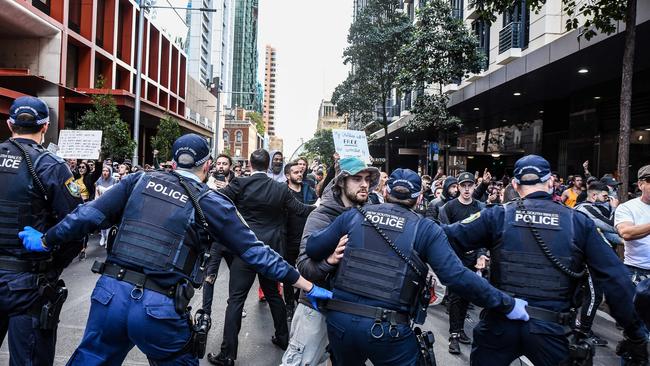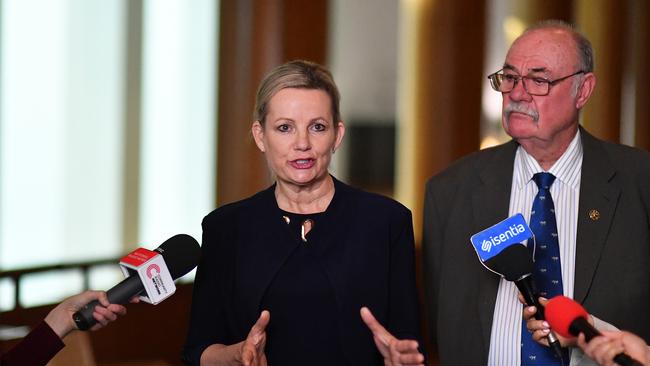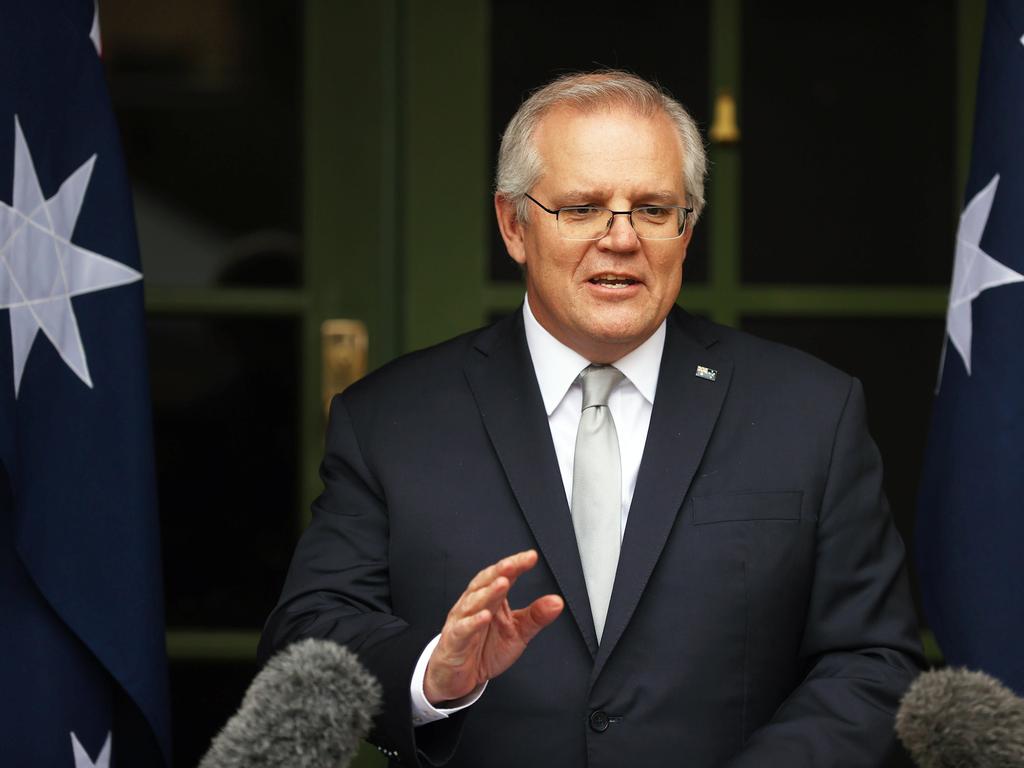
When thousands of Australians protested under the banner of Black Lives Matter during the pandemic in June last year, the ABC’s Patricia Karvelas said: “You don’t get many chances to elevate an issue like this.”
Why did Aboriginal people decide to defy the health advice and protest during a pandemic?@PatsKarvelas: "Because you don't get many chances to elevate an issue like this. This idea that this is imported from the US is baloney."#Insiders#auspolpic.twitter.com/at4sw9lIcf
— Insiders ABC (@InsidersABC) June 6, 2020
When, last weekend, thousands of Australians protested against lockdowns that are wrecking their lives, Karvelas wrote: “I’m genuinely shocked that there are that many people stupid enough to protest and spread a virus that might kill them. My brain hurts.”
I’m genuinely shocked that there are that many people stupid enough to protest and spread a virus that might kill them. My brain hurts. #COVID19nsw
— Patricia Karvelas (@PatsKarvelas) July 24, 2021
During the BLM protests last year, Greens senator Sarah Hanson-Young lauded South Australian police for giving protesters an exemption. “Meanwhile in NSW the government is taking its own citizens to court to stop a peaceful protest. What the?!”
South Australian police give an exemption to allow the #blacklivesmatteraustralia rally in Adelaide tomorrow to go ahead. Meanwhile in NSW the Government is taking its own citizens to court to stop peaceful protest. What the?!
— 💚🌠Sarah Hanson-Young (@sarahinthesen8) June 5, 2020
(Proud & thankful for being a South Australian today)
Last weekend Hanson-Young labelled protesters concerned about the impact of extended lockdowns on their families “selfish idiots”.
This might be an appropriate time to point out that my brain hurts. Maybe these women can’t recall what they said last year. More likely they can but don’t care. They should. The next time Karvelas or Hanson-Young gets hot and bothered about some issue, sensible people might recall that these tweets point to a rubbery attachment to principles. Women who talk so often about good role models for other women really should aim higher.
That said, in the elasticity stakes they are small beer compared with the staggering hypocrisy of a vocal group of climate change activists. Many Australians, especially rural and regional Queenslanders, may regard the ideology of activists lobbying to have the Great Barrier Reef declared in danger to advance their climate agenda as contemptuous at best and treacherous at worst.
But let’s start with hypocrisy. Many Australian environmental groups have been lobbying UNESCO’s World Heritage Committee to place the reef on the List of World Heritage in Danger to pressure the Australian government to do more on climate change. When federal Environment Minister Sussan Ley convinced 19 of the 21 nation members on the committee that it made no sense to target one site – the reef – the green groups went feral, attacking her lobbying efforts. So, let’s get this straight: it’s legitimate for green activists to lobby delegates but wrong for Ley to do it. No. That won’t wash.
A frightful level of hypocrisy was reached by the holdout nation at Friday’s vote. Norway’s most important exports, oil and gas, represent half of its total value of exports. Why didn’t activists lobby for the delightfully named Geirangerfjord and Naeroyfjord to be added to the endangered list to pressure Norway to put a stop to those industries? Because Australia’s Great Barrier Reef has become the political weapon of choice for green activists. While there are legitimate arguments about water quality at the reef, the main agenda of activists is climate change. It’s bigger, sexier and entirely spurious.
The rational position would separate county-specific issues (like water pollution affecting the reef) from global climate change issues that affect every country.
If your argument is global climate change, then all natural wonders should be similarly declared endangered, including the Galapagos Islands, those Norwegian fjords and all 50 marine or coastal World Heritage sites. This would mean the declaration process could not be leveraged by sneaky activists to demand particular policy changes from specific countries like Australia.
But rational arguments aren’t popular among activists. So, Richard Leck from WWF Australia warned that the decision of the World Heritage Committee to defer consideration of putting the reef on the endangered list “gives Australia a very short timeframe to get its house in order, particularly on climate change”.
Imogen Zethoven, a consultant to the Australian Marine Conservation Society, celebrated UNESCO taking a stand on climate change by targeting “one site” – the reef. And let’s not forget reef scientist Terry Hughes (some of his work has been challenged by fellow academic Peter Ridd), former rock star Peter Garrett and businessman Mike Cannon Brookes, who also supported the in-danger listing, net-zero emissions by 2050 and a global target of 1.5C warming, less than the 2C set down by the Paris Agreement.
This direct link between Australia lifting its climate policy targets and declaring the reef in danger is specious. These activists, all clever people, surely know tomorrow Australia could turn off all its lights, ban all cars and planes, return to the pre-industrial time and it would have zero effect on global temperatures. These same activists will also know the policy change they want will have a dramatic effect on Australian jobs and welfare.
The WWF Australia website acknowledges that tourism and fishing bring in $6bn annually and support 69,000 Australian jobs. This seems to matter not a jot to purists who would jeopardise the livelihoods of their fellow Australians in pursuit of an ideological goal that can’t be reached by their recommended policy change. Imagine if, instead of threatening Australian jobs for no effect on the climate, they focused on policy changes that might achieve their goals; for example, lobbying China to stop building coal-fired power stations.
The other big misconception at the centre of their climate ideology is this idea that the only way to protect future generations of Australians is to hit this generation.

This was also the argument in the Federal Court in May when Justice Mordechai Bromberg decided to create and impose a novel duty of care on the Environment Minister to ensure that when she exercises her powers, it’s done in the interests of children and future generations of children.
It’s sweet and emotional claptrap. Every government, every environment minister, must consider a continuum of current and future generations of Australians.
Reality is a neat way of exposing the hypocrisy of activists across law, media, politics, academe and business.








Unhinged, unprincipled politics is nothing new. And no side in a debate is perfect; far from it. But when some people ditch any attachment to principles, let alone intellectual rigour, that should be exposed so reasonable people will look at these participants with a clearer eye. With that aim in mind, let’s shine some sunlight on a few who had something to say about Australians protesting during a pandemic.